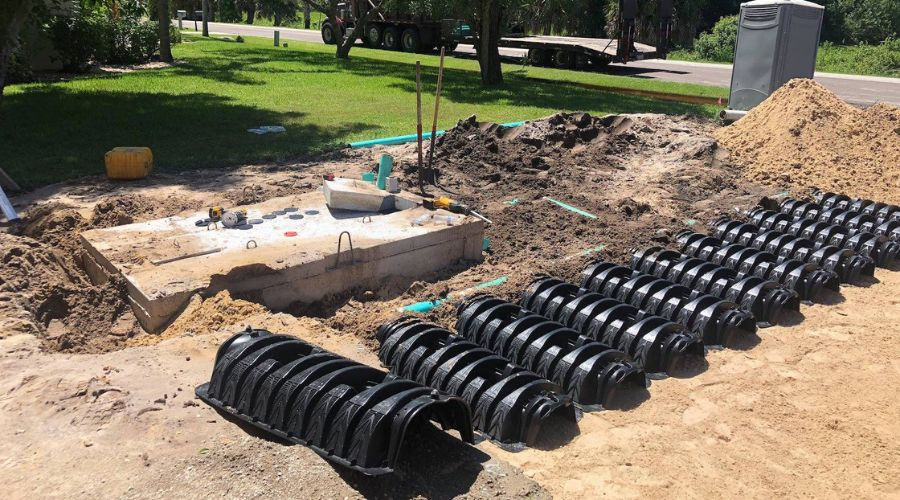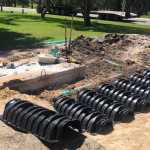Septic Drain Fields Explained
For homes that rely on a septic system to dispose of wastewater rather than a municipal sewer, few things are more unpleasant and inconvenient than a drain field failure. To understand what causes a drain field to fail (and how to avoid it), it’s helpful to know how septic drain fields work.
After wastewater from the home flows into the septic tank, it separates into three elements as it is being digested by the anaerobic bacteria inside the tank – sludge, scum, and effluent. Sludge is the solid waste that sinks to the bottom. Oil and grease float to the top, forming the scum. Effluent is the liquid waste that’s left over. This effluent flows out of the tank through an array of perforated pipes buried 3-4 feet underground and surrounded by soil or gravel. This is the septic drain field (also called a leach field).
From here, the effluent seeps through the gravel or soil, essentially filtering out the nasty bacteria and other impurities, leaving clean water that makes its way into the water table. But when the leach field stops working properly, it can cause all kinds of nasty problems – not the least of which is replacing the whole drain field. So this article will lay out common signs of leach field failure, what can cause it, and how to prevent it!
Nasty Odors Coming From the Drain Field
The first sign of a possible drain field failure is a foul smell near the drain field or septic system. If everything is working properly, any odors should be contained underground. So if homeowners notice a rotten egg or sewage smell around their septic drain field, it may mean that the effluent isn’t draining properly, the system has become too full, or the drain field is saturated with water.
Homeowners may also notice foul odors coming from the home’s drains, which can indicate a drain field problem or another issue with the septic system, such as a clog. But whether in the home or the yard, that nasty odor means trouble, so homeowners should call their septic service company immediately.
Water Puddles or Soggy Spots

Standing water, wet spots, or unusually thick grass near the drain field or septic tank may also indicate leach field problems – particularly if a nasty odor accompanies them. In some cases, this may mean that the drain field has become saturated with water due to a heavy rainstorm or exceptionally high water usage in the home. Or, it may mean that solid waste has clogged the drain field.
Depending on the underlying cause and severity of the problem, it may be possible to dry out and clean a septic leach field – a process called rejuvenation. But in many cases, excavating and replacing the drain field may be necessary.
Drains are Slow or Clogged

Another possible indicator of a leach field failure is if the home’s drains seem slower than normal or the toilets don’t flush properly (or clog frequently). If the septic drain field isn’t draining properly, the septic tank will fill up with effluent quickly, and the home’s wastewater won’t have anywhere to go. Before long, if the problem isn’t addressed, sewage will be backing up into the home’s drains!
Homeowners may notice one of these signs or any combination, but the important thing is to act fast before the problem worsens. Resolving the issue by cleaning out the tank and performing drain field repair/rejuvenation may be possible, but more often than not, a drain field replacement is necessary.
It’s important to note, however, that leach field failure is most often the result of inadequate maintenance and inappropriate materials in the wastewater, so homeowners can typically avoid these problems by having their septic systems serviced regularly and being mindful about what they put down the drains!
About Capital City Septic Services
Capital City Septic Services experts have been proudly serving the Tallahassee community since 1986. Their fast response times, honest & competitive pricing, top-notch workmanship, and outstanding customer service have earned them numerous 5-star reviews from satisfied customers. Their licensed and insured technicians are available 24/7 for emergency service, so don’t wait to call Capital City Septic Services for leach field replacement in Tallahassee, FL!



























